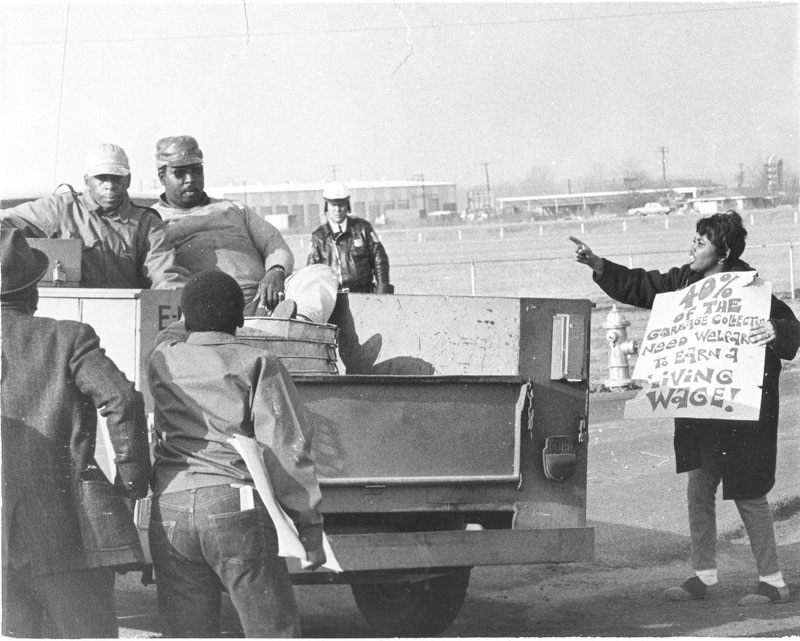
“Strikers and scabs”. Volunteer Voices: The Growth of Democracy in Tennessee. Original Image: Special Collections Dept., University Libraries, University of Memphis.
March 1, 1968
“It’s tough now,” said Charley Martin, a striking sanitation worker. “I’ve got six kids and they need food.” Martin’s words are representative of many of his peers. Sanitation workers received their last check on February 20, but it was much lower than normal as the strike started in the middle of a pay period. Faced with bills and normal living expenses, the workers are feeling financially strained as they look for assistance to help continue the strike.
The workers’ union would normally provide funds to support workers while a strike is ongoing, explained Jesse Epps, a representative of the American Federation of State, County and Municipal Employees, but the strike had already begun when union officials arrived in Memphis. Without the union’s support structure in place prior to the strike, the union is planning to negotiate for deferred payments on workers’ debts and bills and to depend on public aid. The union has already secured two months of utility bill forgiveness from MLGW, received agreements for paused rent from around 100 property owners while the strike is ongoing, and negotiated past due bill forgiveness from many finance companies. While workers’ future financial situation is important, food is a more pressing concern as Martin’s children can attest.
Last week, the union bought $2,000 worth of staple foods to provide immediate assistance to those in greatest need. Epps estimates the workers will need around $15,000 per week for food, shelter, and emergency aid. Including the $5,000 check Mr. Wurf brought to Memphis when he attended the Memphis Ministers Meeting on the 19th, the union had around $11,000 as of the 22nd. However, these funds are earmarked for emergencies and workers must apply to receive them. Fortunately for the strikers, community organizations have helped supplement the union’s efforts.
The Concerned Citizens for Sanitation Workers and Families is helping meet families’ food needs. Distributing from the Mason Temple Church of God in Christ, the organization provided sacks of food to over 500 families by the end of the 22nd. O.W. Pickett, the head of the project, stated the demand has almost cleaned them out, but they anticipate receiving additional donations.
Two recent gatherings also resulted in significant contributions to the workers’ cause. About 1,000 people, including representatives from 12 churches and a labor union, met at Clayborn Temple on the 25th. After a speech advocating “‘justice and jobs’ for all Negroes” by Dr. Ralph Jackson, contributions amounting to $1,590 were collected. Three days later on the 28th, union leaders and sympathizers met at St. James African Methodist Episcopal Church. During the speeches, union officials declared they had received an additional $10,000 from various groups. Local ministers followed this announcement with another $2,000 contribution and then another $806 was collected from attendees by the time all the speeches had ended.
In addition to union and community support, the strikers are also receiving government aid in what some consider a controversial decision. Because the strikers have no income and lack union disbursements while the strike is ongoing, food stamp applications for workers began last week on the 23rd. There were initial concerns that the cost of the stamps may impede the workers’ ability to obtain the stamps because an applicant must pay a certain amount for the stamps depending on their income level, but Mayor Loeb has authorized the Tennessee Department of Public Welfare to bill the Memphis and Shelby County Welfare Commission for the cost of food stamps up to $10,000. As part of his rationale, Mayor Loeb contends that the city wants the men back and he hoped showing concern for the other side would help ease tensions.
Despite the aid available or perhaps because of the stress involved with attaining it, around 40 strikers have returned to work. The financial strain may grow as the $10,000 approved by the city for food stamps has already been depleted and no new funding has yet to be approved. Ultimately, how these stresses will affect the strikers is speculation, but for some workers, they have faith the aid will be there if needed as Samuel Bumpus, a striking sanitation worker, stated “I haven’t received any help yet myself but if I needed it I’m sure I would get it.”
“Debate of Garbage Centered on Wages.” Press Scimitar, February 19, 1968.
“Interview with Henry Loeb”, (Part 10). YouTube , Uploaded by Crossroads Archive. Original tapes found in Memphis Search for Meaning Committee Records, University of Memphis Libraries Preservation and Special Collections Department.
Lentz, Richard. “Union Places ‘Hope’ As Financial Strain Starts.” The Commercial Appeal, February 22, 1968.
Letter from Jerrold A. Moore to Commissioner James W. Moore, February 26, 1968. Series III, Box 238, Folder 9. Papers of Henry Loeb III. History Department, Memphis Public Libraries, Memphis, TN.
Letter from Jerrold A. Moore to Charles Blackburn, February 26, 1968. Series III, Box 238, Folder 9. Papers of Henry Loeb III. History Department, Memphis Public Libraries, Memphis, TN.
Letter from Jerrold A. Moore to Mayor Henry Loeb, February 26, 1968. Series III, Box 238, Folder 9. Papers of Henry Loeb III. History Department, Memphis Public Libraries, Memphis, TN.
Letter from Jerrold A. Moore to O.W. Pickett.=, February 26, 1968. Series III, Box 238, Folder 9. Papers of Henry Loeb III. History Department, Memphis Public Libraries, Memphis, TN.
Letter from Jerrold A. Moore to O.W. Pickett, March 1, 1968. Series III, Box 238, Folder 9. Papers of Henry Loeb III. History Department, Memphis Public Libraries, Memphis, TN.
Letter from Mayor Henry Loeb to Mrs. Cleve Worth, March 1, 1968. Series III, Box 238, Folder 9. Papers of Henry Loeb III. History Department, Memphis Public Libraries, Memphis, TN.
Letter from Mrs. Cleve Worth to Mayor Henry Loeb, Undated. Series III, Box 238, Folder 9. Papers of Henry Loeb III. History Department, Memphis Public Libraries, Memphis, TN.
Sweat, Joseph. “Loeb May Offer Compromise Plan to Collect Dues.” The Commercial Appeal, February 27, 1968.
Sweat, Joseph. “Students Strike Back.” The Commercial Appeal, February 27, 1968.






